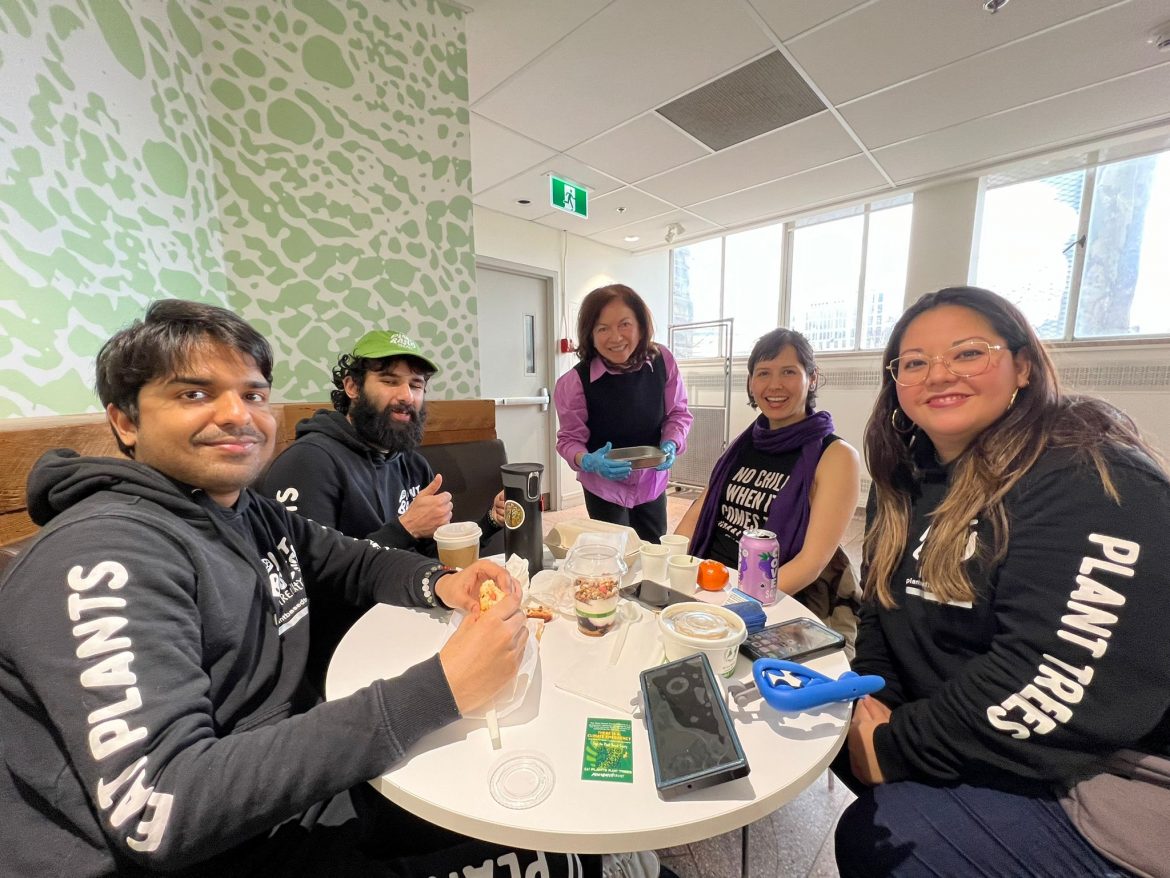Photo Credit: Yarim Hinojosa
Veganuary and other milestones
Stefanie Menezes, Lifestyle Editor
As the world becomes more aware of climate change, societies everywhere have seen the rise of green initiatives intended to reduce humanity’s negative impact on the planet and protect the environment for future generations. At U of T, eco-conscious animal lovers celebrate one year since they brought the global Plant-Based Treaty campaign to campus. Yarim Hinojosa, Uday Singh, and Aniket Biala are the core members of the Plant-Based Treaty Club, and recently, they sat down with The Mike to share the success of their “Veganuary” collaboration with U of T restaurant La Taula Verde and to discuss their ongoing initiatives.
The Plant-Based Treaty is a global campaign based on the Paris Climate Agreement, a 2015 treaty that legally binds governments to their responsibilities regarding climate crises. The campaign invites individuals, organizations, businesses, and cities worldwide to commit to and endorse a plant-based lifestyle. Its three fundamental principles are “Relinquish,” or cease the expansion of animal agriculture; “Redirect” the current food system to plant-based methods and products; and “Restore” the environment and its ecosystems globally. The treaty has been endorsed by more than 1,300 organizations and 1,600 businesses, as well as 26 cities worldwide. Among its most famous individual endorsers are The Beatles’ Paul McCartney; Nobel Prize winner Sidney Altman, whose groundbreaking genetics discovery permanently changed the field of molecular biology; and eight-time U.S. National Cycling Champion Dotsie Bausch, whose accolades include an Olympic silver medal, two Pan American gold medals, and a world record in the sport of cycling.
According to club president Yarim Hinojosa, the Plant-Based Treaty Club has grown to around 40 members across all three campuses since its establishment in March 2023, and in January 2024, it partnered with beloved campus restaurant La Taula Verde, located in the basement of Gerstein Library, to create an entirely vegan menu for the month.
La Taula Verde’s head chef, Nancy Manotas, shares that her enthusiasm for the collaboration results from studying the relationship between food and longevity. Chef Nancy carefully considers the nutritional value of everything on her menu, even going so far as to opt for ingredients like arugula over lettuce in her sandwiches and a specific locally-made brand of chocolate. During Veganuary, her menu included high-protein organic yogurt cups, scones made with organic spelt, vegan empanadas, and a plant-based burger with guacamole — the last two still available on her regular menu.
Though the original Plant-Based Treaty campaign maintains that adopting a vegan diet is the most effective way for an individual to help the planet, the club representatives understand that the shift can be difficult socially and economically. In the last year, their efforts to share the plant-based lifestyle have included movie nights, a free pizza-party raffle, protests against fossil fuels in favour of protecting indigenous land claims, and many other similar events. At the U of T Mississauga campus, the Locus vending machine contains cookies from the plant-based brand Sweets From The Earth, which has intentionally lowered its prices to make the treats more affordable for students. Some of their upcoming movements involve carbon-labeling on food packaging to dispel the myth that vegan food and agriculture are worse for the environment than the animal-based option, and the inclusion of plant-based foods; plant-based milk is made readily available at cafes and restaurants so that they are no longer the “alternative” to dairy milk, as well as events based around Earth Day and “No Meat” May.
Aside from information about their events and campaigns, the Plant-Based Treaty Club’s representatives also share advice about starting a more plant-based and sustainable life. Their three leading suggestions are to find your vegan community, find your “vegan why,” and find out more. Finding your community may consist of going to club events or talking to others on social media because having conversations that help you grow and learn is empowering. Finding your “vegan why” means finding your own personal motivation to make the change. For some, a plant-based lifestyle is a great way to fight against the climate crisis, while others are oriented around animal rights and activism. Hinojosa, Singh, and Biala all share a similar milestone in their vegan journey: living with a dog. Having an animal companion they each loved led them to think critically about animal rights and their treatment in the agricultural industry. Hinojosa suggests visiting a sanctuary or shrine to interact with animals and discover their personalities. She states that a critical aspect of the plant-based mindset is refusing to commodify anyone, human or animal, because everyone is interconnected in coming up with the solution to this crisis.
This March marks the Plant-Based Treaty Club’s second year at U of T and the beginning of many new and exciting projects. The team believes that with the resources and networks available at a university level, students can enact change, and they invite all students to reach out, learn more, and get involved. More information can be found at https://plantbasedtreaty.org/ and @plantbasedtreatyuoft on Instagram.



